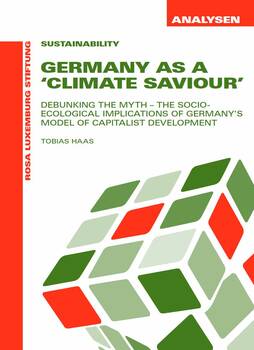
No doubt you still remember the way things used to be: before Özil and the #MeTwo racism debate, before the ‘Mannschaft’ suffered its ignominious defeat in the group stage of the men’s World Cup in Russia. And, of course,before that ‘unnecessary’ protest in Hambach Forest, where Germany showed the world that it is not only a world champion at mining and burning lignite, but also that is has no scruples about trampling on civil liberties to get at this lignite. Indeed, before all these unpleasant events took place, people’s perception of Germany at home and abroad appeared to be influenced by a very different image. Back then, Germans were supposedly living in the legendary ‘Kingdom of the Climate Saviour’.
The tale went something like this: Once upon a time there was a land in the heart of Europe that had learned from its mistakes. Purged by the painful experience of coming to terms with its dreadful history, it was able to guide its neighbours during the turbulent years of the ‘Great Recession’ (the financial and economic crisis that started in 2008). It led the way in women’s and men’s football, in its generous attitude to refugees, in the rational, calm demeanour of its head of government – a woman who donned the mantle of ‘Leader of the Free World’ when the madman took office in Washington – and, of course in the field of environmental policy, especially climate policy, an area in which for decades this country had been recognised as a pioneer. Long before the tabloids hailed this head of government as ‘Climate Chancellor’ at the G8 summit in Heiligendamm, her fortunate nation had already acquired an almost mythical status as the star performer at the annual UN climate negotiations. And, when Donald Trump announced in early June 2017 that the US was pulling out of the Paris Climate Agreement, it was only natural to assume that the hopes of the world now rested on this nation’s slender shoulders. It was up to Germany at last do what it had repeatedly attempted to do in the past: to lead the world, this time out of the fossilised era and into the age of green growth – the world of climate action.
As a fitting celebration of Germany’s leading role in climate protection, the world convened in Bonn last year for the 23rd climate summit. The conference may have been presided over by Fiji, but the location was Bonn: a city in the Rhineland – and a major mining area for lignite, or brown coal. Is this a winter’s tale in brown? It is, above all, a fairy tale. As the following articles show, Germany is far from being an ecological pioneer or a champion of climate protection. On the contrary, the articles show that its wealth is based on an economic model that is highly destructive, both socially and environmentally, that Germany’s global leadership relates primarily to lignite mining rather than to the development of renewables, and that there is still a lot of work to be done if Germany is finally to close the gap between its claims and the reality.
Tadzio Müller, Senior Advisor for Climate Justice and Energy Democracy, Rosa-Luxemburg-Stiftung Berlin, September 2018
Content
1 Introduction
2 Capitalism and the green movement in Germany
3 Germany: a pioneer in climate protection?
3.1 An ecological glimmer of hope? Initial steps towards an Energiewende
3.2 Busy roads, little action: the failure to transform transport
3.3 No signs of a transition in agriculture
3.4 The downside of the export economy: Germany’s raw materials policy
3.5 The champion of climate policy is missing its goals
4 The failure of German climate policy